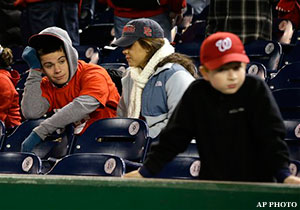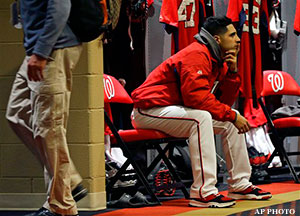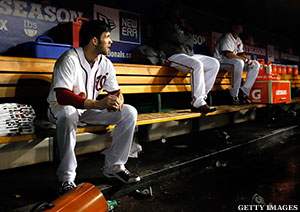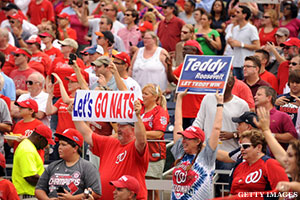
Sean McCalley hasn't felt a letdown like the Washington Nationals' Game 5 loss to the St. Louis Cardinals since John Kerry lost the 2004 presidential election. The 24 year-old wasn't even old enough to vote in 2004, but Jon Stewart and Stephen Colbert were his closest allies during the campaign.
"All of my personal interest was invested in John Kerry winning," McCalley says. "I stayed up until 4 a.m. the night of the election, and then he lost."
McCalley felt utter defeat. He went to school that morning with two hours of sleep, and decided to put politics by the wayside. But every man needs a passion in life.
Enter the Nats. Who needs politics when you've got a new baseball team?
After 33 years without an MLB team, baseball fans in Washington shed their loose affiliations with the Orioles and welcomed the hometown Nationals with fist-pumping arms. Fast forward to this year, as Washington put together a dream season en route to a National League East title.
But it all fell apart late in Game 5 of the Division Series against the Cardinals. Up two runs in the ninth and one strike away from advancing, the Nationals caved to a St. Louis rally and stood shattered as the defending World Series champs moved on to the National League Championship Series. Anyone who has ever watched their beloved, once-underdog team fall apart when it matters most gets it. "It's heartbreaking," McCalley says. "It screws with your sense of justice."

People use those words to describe a breakup, the loss of a job, even a deadly disease. But a baseball game? What is it that makes us care so much about the fate of people we don't know, that makes us feel like we are on the turf, falling apart with them?
Dr. Don Forsyth, professor of psychology and sociology at the University of Richmond, likens it to an addiction.
"At a basic level -- perhaps even instinctive level -- people identify with their groups; they feel as though they are part of the team, even though they are only spectators," he says. "But, as identification increases, good feelings start to flow when points are scored, games are won, and opponents are vanquished."
Some might argue we feel the same emotional connection with rock stars or other celebrities. But music and movie fans don't get on the same level as sports fans. Sports fans wear the same clothes as the players they idolize, which Dr. Michael Serazio, professor of communication at Fairfield University, suggests lends itself to that deeper connection with what's happening on the field than what happens at a movie premiere or concert. (Lady Gaga's Little Monsters, Twihards, Harry Potterheads and the Star Wars faction notwithstanding.)
There's even a Psych 101 term for all of that identification: Basking in reflected glory, or BIRGing. Just walk around a college campus the day after a big football win and you'll see students who couldn't care less about football wearing their team sweatshirt. The day after a loss? Back to The North Face. The more we identify with the team, the better we feel when they succeed.
We allow ourselves to be overcome with positive emotions, so when the team loses, we have to stick with the team until they win again to feel the rush. It makes us feel good about ourselves, and as Dr. Forsyth explains, rooting for a team is a lot easier than getting a good grade on a paper or a compliment from the boss.

"Like some addictions, over time the joy of the team winning becomes weaker, but the anguish over the loss becomes stronger -- so the highly committed fan must root for the team so that the negative emotions can be eased," Dr. Forsyth says.
But for some fans, it's about even more. Most of us have to share those positive feelings with other fans, or what's the point? It's the rush of the crowd at the stadium, the clinking of beer mugs at the pub, the piling in front of that one friend's huge TV that makes the season memorable.
"Research suggests that family has long been the primary socializing agent for sports fandom -- and, for young men, in particular, their fathers," says Dr. Serazio, who teaches a course on sports and popular culture. "More broadly than that, though, our peers and the wider geographic community we're raised in plays a key role as well. I suspect that the strong, warm emotions we associate with those relationships and networks become inextricable from our attachment to particular teams."
For McCalley, it was teaching his Brazilian girlfriend Carolina Petersen the rules of the game so she would actually watch with him.
"I drew all the diagrams, explained all the rules and she started really liking it. I got into the players' personalities, the drama behind Bryce Harper, who plays pranks in the locker room," he says. "We were together when we saw them clinch, it was getting hairy but in the end, I think she was more excited than I was."
It's all fun and games until someone needs to protect their elbow. When the Nationals management ended Stephen Strasburg's season three weeks early, those warm fuzzy feelings started to fade for many fans. They were replaced by anger and anxiety. McCalley stayed optimistic, because that's what feels good.
"I thought, these are men," he says. "They are workers. They are going to do what they have to do to win."
But they didn't.
"People use every psychological defense they can when their team experiences a loss -- particularly a heartbreaking one," Dr. Forsyth says. "I wouldn't go so far as to say it is like grieving, but the stages of coping with a loss -- denial, anger, bargaining, depression, acceptance -- are all relevant. Denial is first -- this cannot be true, we are a better team than this, we weren't supposed to lose, this can't be happening. And, along with denial is the blaming, excusing, what-if thinking: We got some bad calls, we should have never benched Strasburg, we are a young team, who can we scapegoat, etc. Then there is the emotion -- the depression, the anger, the sadness."

Rick Plotkin, a longtime Washingtonian, was on vacation at the beach for Game 5, but was glued to the screen.
"I jumped the gun and posted to Facebook when the team was up 3-0 and again when the lead was 6-0," Plotkin says. "It was like the kiss of death since I noted Gio Gonzalez needed to deliver the final nail in the coffin right then, and of course he didn't. I watched to the bitter end and awoke on Saturday morning in a funk."
His 5-year-old son, a Bryce Harper fan, didn't exactly help, asking, "I want to see the Nats, I want to see the Nats," for hours after the loss. What can a father do but show his son the highlights of the season that was, and hope the team stays healthy and comes back swinging in 2013. It's a coping mechanism, like dealing with any other loss. If you don't find some hope, you'll never recover.
McCalley shares his fellow Nats fans' optimism.
"I'm gonna go in there, no holds barred. We've proven that we can contend, and this is how I reconcile it with myself," he says. "At the beginning of the season, it was doubtful we'd even get to the playoffs, but when we got to Game 5 of the NLDS, I looked at it like we were playing with house money. Next year, the expectations are higher."
Perhaps the thing that will really keep him going? His girlfriend Carolina is officially "a baseball fan for life."








